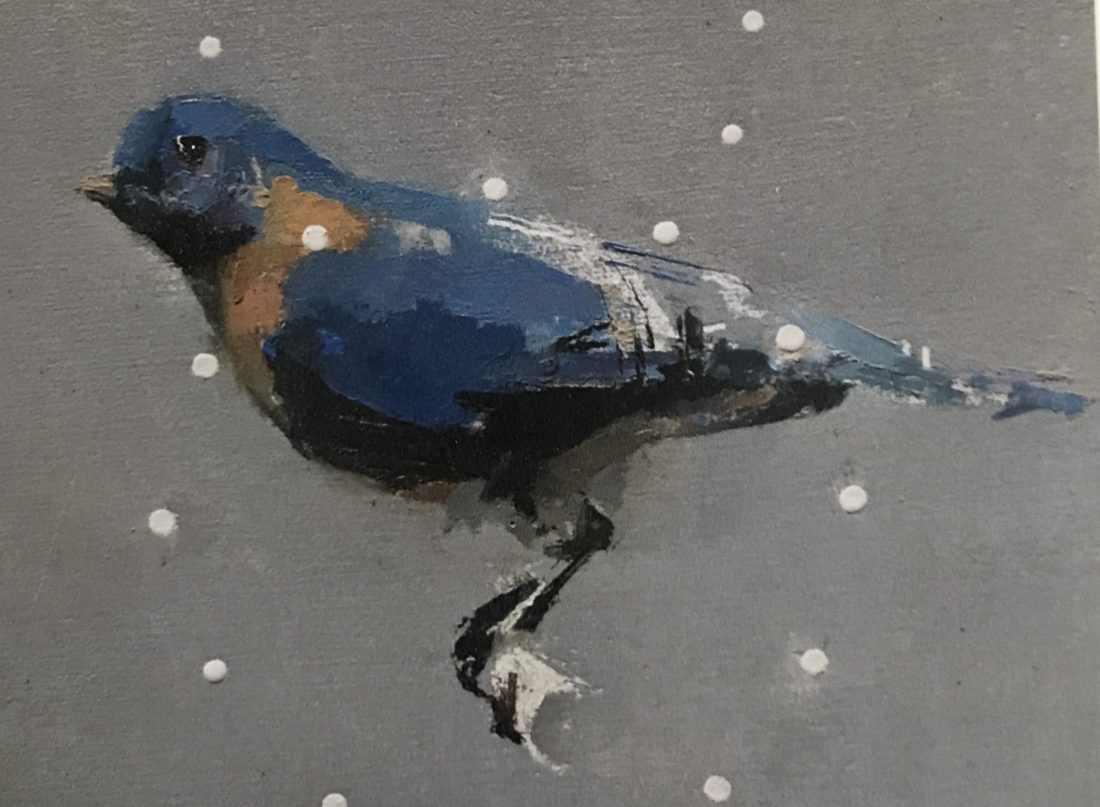The Bluebird of Happiness
In this strange “at home” but keenly homeless time, I drove from Boston to the family house in New Hampshire to check on things. Mud season will soon be upon us. A trip to Bermuda had been cancelled. It seemed the quiet of the country might do me good.
As soon as I arrived, I unpacked my laptop for a global Zoom teleconference. The topic: how best to care for ourselves, our spiritual communities and the planet during the pandemic.
The participants, from numerous spiritual traditions, offered thoughts on acceptance, staying grounded, and the powerful invitation of the present crisis to teach us a new sensitivity to the non-physical– to the interrelationships that bind us to a larger reality. After an hour of listening, I felt steadied and affirmed.
As I was logging out, my husband passed through the room and casually remarked. “There were two birds with blue stripes up at the old swallow house.”
This was good news in a grey time. The birds, at least, were conforming to expectations, returning and taking up residence, reminding us in the process that life on levels distant from our fears, was continuing.
He isn’t a birder, so I assumed they were jays. I spent a satisfying afternoon cleaning a closet, reading, and finally settling down with my knitting in the worn wing back by the window. As the sun began to set, I looked up and my eye fell on the bird house. A small bird was perched there like a sentry absorbing the day’s last warmth before a cold night fell. Its breast was radiantly white – almost haloed – by the light of the falling sun. I picked up the field glasses. Just then, he turned and revealed his magnificent blue feathers.
I let out a cry. An Eastern Bluebird! We haven’t seen one here for several years. I couldn’t get enough of him. That glorious blue, and tawny breast, in a relentlessly grim, colorless time was like a living icon, or a kind of transfiguration.
I was in good company. The bluebird has been the harbinger of happiness across cultures for thousands of years. One of the oldest myths, from the 2nd century B.C. Shang Dynasty, presents the bluebird as the messenger of a fearsome goddess, Xi Wangmu. By the 1st century, the goddess had morphed into a fairy queen, friend of nuns and singing girls. I’d like to think that the bluebird played a role in transforming her ferocity. In Russian fairy tales, the bluebird is the symbol of hope. On May Day, 1867, Ralph Waldo Emerson wrote:
The world rolls round,—mistrust it not,—
Befalls again what once befell;
All things return, both sphere and mote,
And I shall hear my bluebird’s note,
And dream the dream of Auburn dell.
It is my experience that only great suffering and great beauty compel us to the state of true Presence. Something in us — sharp, almost painful in its acuity – breaks through the miasma of anxiety and self-absorption and overwhelm to stand before life as we are meant always to stand, but seldom do.
As I continued to hold the glasses trained on the bird house, the female returned. I watched in awe as their dance unfolded. The male swung away and perched on a nearby bough while she sailed in and took the spot atop the house. While the light held, they crisscrossed my window and one another in a wide-flung dance of distance and intimacy that was their seasonal rite of exploration and homecoming after a long winter.
Theirs was the eternal dance of opposites within a shared reality that would ultimately produce a new thing.
In a flash, I realized: the bluebird was the opposing force to the suffering that had suffused my awareness for days (amply and destructively stoked by a heavy diet of online news). Wildly, unexpectedly, paradoxically, miraculously — the bluebird. The two didn’t so much cancel each other out as they revealed two sides of the same reality: life, in all of its brokenness and beauty.
Earlier I’d listened as a rabbi of the Jewish mystical traditions, Ted Falcon, spoke about the futility of resisting fear or of trying to talk ourselves out of it.
“The ego is that part of us that holds the illusion of the ‘separate self,’” he said. “The ego is always afraid. It’s a waste of time to try and talk it out of its fear.”
He paused.
“The pain comes from forgetting that the ego is not all that we are.”
I had stopped knitting at this point and listened more closely.
When we are able to become aware our fear, he continued, we also are able to be aware of the source of our awareness. “That inner voice, that witness, allows us to be bigger than our fear.”
He was speaking, of course, of Presence.
Presence is the reconciling element. It is our capacity to stand in attentive consciousness, with love and compassion, towards the whole of our broken, beautiful world. This is what makes us capable of healing ourselves and one another. Because life is more than suffering, and we are more than our fear.
“Bluebird w/halos” by Christopher DiPietro





Nancy rappaport
March 28, 2020at1:56 amYour presence along with presence comes through. . I found comfort in your word. I was listening to Buddhist monk who used prayer
May we find rest in the uncertainty
Calm in the unknown and I have repeated this challenge to myself asking for faith .
Kathleen Hirsch
March 28, 2020at7:57 amNamaste, Nancy.
Susan Porter
March 27, 2020at10:15 amKathleen,
Thank you for sharing this moment, and your reflections. This is a time when we constantly need to be reminded of the continuing presence, the flow of life beyond our concept of it, and the beauty that we are privy to even in the midst of pain. I am amazed that these moments of being present can happen every day if we are attuned to them. You’ve reminded me to be open, to listen, to look around, even in the city on a day like today. There are miracles happening, life is continuing, and the cycles of renewal are happening even in the midst of this crisis. I feel more grounded after reading this!
Kathleen Hirsch
March 27, 2020at12:01 pmSusan,
Thank you for this lovely affirmation. Yes, looking and attending is critical for the sake of our souls.
Blessings to you.